The new releases are plentiful throughout October, and fortunately I’ve been better about keeping on top of them this year than I have in the past. Some of these are albums I’ve been looking forward to for most of the year, the new Wolfheart being chief among them. I will admit to being extremely curious about Amaranthe’s Helix, their first post Jake Berg release and debut of new clean singer Nils Molin (of Dynazty fame). Some of you might remember that I wasn’t that keen on their last record Maximalism, which saw Berg’s input and role greatly diminished and as a result led to his departure (which had the silver lining of resulting in a really fun record by Cyhra, his new band with Jesper Stromblad). And of course there’s a new album by Germany’s trad metal stalwarts Brainstorm, a band I’ve been a fan of since way back in the early 2000s during the Metus Mortis / Soul Temptation era. There’s something appropriately fitting about these guys delivering a new record this particular year when I think power metal is in the midst of a sweeping artistic resurgence, a reminder that there are still older bands who have stayed relatively consistent with their style when many of their peers started incorporating hard rock / AOR stylings. But does the new album stack up against the staggering amount of excellent releases by newer power metal bands? I’ll tackle that and other burning questions in the reviews below!
Thrawsunblat – Great Brunswick Forest:

I’ve written about Canada’s Thrawsunblat before, with the band’s 2016’s album Metachthonia landing on that year’s best albums list. Borne out of the incense smoke of Woods of Ypres, former Woods guitarist Joel Violette along with Immortal Bird vocalist Rae Amitay (here on drums) have been quietly releasing amazingly strong blackened folk metal records since 2013, and its been interesting to behold the range of this project, from maritime folk infused charm to blistering black metal fury. Their folk aspect is at once inspired by and very removed from the European folk that we commonly associate with the idea of folk metal, with Violette embracing his native roots of all things Canadian and pushing to the fore folk music of Northeast Canada and in particular the Atlantic coast. I’m only passingly familiar with that kind of music, but I gather that its related to that strain of New Englander lyrical folk song that I’ve found across the years, not quite sea-shanty material but musically joyous all the same. The black metal sieve that Thrawsunblat run this folk music through results in something that is rather unique across the folk metal landscape, one very different from other North American black metal artists that are mostly from the Pacific Northwest.
All that being said about the band’s rich folk influences, Great Brunswick Forest is a surprising album for Violette and Amitay to release right now as a followup to what was a roiling, furious black metal affair in Metachthonia. Picking up where the band left off from the plaintive maritime folk of “Goose River (Mourner’s March)” and the gorgeous gem “Maritime Shores” from the Wanderer album, the new record is an entirely acoustic endeavor, except that it doesn’t behave like the way you’d expect a typical acoustic recording would. That means instead of ballads and forlorn laments, these songs are uptempo, jaunty affairs, bright and bursting with chiming guitars, lively violins, and a swinging percussive attack. The album starts out with its most representative model of this in “Green Man of East Canada”, a song that owes its lyrical influence directly to folk music, with its tale of two strangers pausing to speak near a darkened wood. Violette is a sharp, nuanced lyricist, and you can tell that he really loves the vein of woodsy Canadian folk that he’s clearly tapping into here, relishing it with every line and stanza; “I’m no stranger to these lands, / Though they’re not my own. / I left with the changed tides / To call this Brunswick kingdom home”.
Things get more adventurous musically with the aggressively uptempo “Here I Am A Fortress” and the chaotic frenzy heard in “Thus Spoke the Wind”. The former boasts some tremolo-esque acoustic guitar patterns amidst the most traditionally black metal song structure on the album, and the cross pollination of style and instrumental medium is strange to behold at first, but its such a well written song that you become accustomed to the jarring juxtaposition quickly. A key component in making experiments like this one successful is the fiddle playing of one Keegan MC, who is all over this album and really becomes the musical glue and stylistic motif throughout. He has a way of engaging his instrument to create moments of dissonance that support the acoustic tremolo sections and give them a dose of ringing, electric vibrancy. But its Amitay who steals the spotlight in “Thus Spoke…” with her unleashing a battery of what you might term acoustic blast beats during the middle instrumental passage, pushing the way forward for tremolo style acoustic guitar riffs and slicing fiddle blasts to barrel forward in the album’s heaviest, most astonishing section. It was a little chaotic to make heads or tails of at first, but now the song is a favorite of mine, and I always seem to pay attention to that instrumental break.
The absolute show stealer of a song here however is “Via Canadensis”, where I think Violette sneaks in some subtle electric guitar throughout to add some muted crunch to what is a joyful, perfect slice of folk metal. I get a very strong Woods 5 vibe from this song, and musically it wouldn’t have felt out of place on that album where David Gold played around with contrasting musical and lyrical clashes. Lyrically though, this is Violette at his most positive, singing during the refrain “On we go — to the standing stones we’ve yet to raise!”, and that lyric takes on a mythic quality during the nearly a capella mid-song bridge. Similarly, I love the lyrical sentiment and supporting musical sweep that pins together the second half of “Dark Sky Sanctuary”, where Violette delivers his most smooth vocal melody yet in a hooky, Vintersorg-ian chorus. Like the folk metal legend himself, Violette’s vocals are probably going to be hit and miss for some, but frankly most of these songs wouldn’t sound right with another singer, having been attuned to his voice in the writing process. But “Dark Sky Sanctuary” is the exception, as I could hear this slice of folk-pop magic being sung by anyone and everyone, including a female voice (hopefully at some point YouTube will yield a cover version of this). This a magical album, particularly in its arrival at this time of the year when autumn is making its strongest entrance in years. I can’t predict where Violette and Amitay will take Thrawsunblat next, but I’m absolutely over the moon about where they’ve been throughout their career.
Brainstorm – Midnight Ghost:

So we all have our comfort foods right? Mine would be mundane but occasionally essential things like sourdough bread with real butter, soft chocolate chip cookies in bar form like my mom used to make, or whole wheat toast spread with peanut butter and a drizzle of honey with a cup of coffee —- actually this is starting to sound like the ramblings of one that has recently begun another bout of carb kicking (dammit). But thankfully here’s my metal equivalent of comfort food back with a new release to help take the edge off, as Brainstorm has been consistent in familiarity and quality for the better part of two decades now. Its a little over-simplifying to refer to them as meat and potatoes metal, because underneath those chunky riffs and earwormy choruses is a Nevermore-esque progressive technicality. Singer Andy B. Frank is one of the most underrated/overlooked vocalists in metal, capable of an operatic tenor, as well as a gritty, Jon Oliva-esque snarl perfect for the kind of heavier trad that Brainstorm specialize in. They’re a perfect “centering” band, for those times when you feel you’ve gone too far on the avant-garde/blackgaze/ambient/noise/funeral doom end of the metal spectrum or perhaps too far down the Rhapsody/Freedom Call side and need a reminder of metal at its most melodic AND heavy; so you queue up a classic like Soul Temptation or Metus Mortis (or better yet, this still exceptional live set at Wacken 2004 that is the epitome of everything wonderful about our genre) to get yourself right.
Its commendable that Midnight Ghost is the band’s twelfth release, as they’ve been knocking out records at far more regular intervals than most metal bands, at times even delivering two in back to back years. Whats absolutely astonishing however, is that this may very well be the most inspired and accomplished album they’ve ever made, in a recording career that started way back in 1997. Because the core of their sound hasn’t changed over their career, aside from a more welcoming embrace of the choral vocal backed chorus and a touch more symphonic keyboard dressing, I’m speaking to the quality of the songwriting. This is evident in the instant ear-worm gratification of “Ravenous Minds”, as classic a Brainstorm song we’ve ever heard with Frank’s vocals delivered with a sense of empowering belief. He has such staggering strength as a vocalist, singing here with a wildly confident display of his range, from gruff lows to Queensryche-ian highs in that spectacular chorus. At this point, Frank knows the pivot points around his vocals so much that you can hear that awareness reflected in the songwriting, particularly in that everything flows around his crafting of the vocal melodies. You hear it in the string and piano intro to “Revealing the Darkness”, the melody previewing Frank’s epic, arcing vocal during the chorus. Founding guitarists Torsten Ihlenfeld and Milan Loncaric rattle off a machine gun spray of punctuating bursts that are always book ended by a meaty riff to round out a verse section. Its that commitment to heaviness that separates Brainstorm’s dalliances with prog-metal from that of bands such as Dream Theater and Seventh Wonder.
Speaking of other bands, I can’t be the only one who hears a real Iced Earth Horror Show era meets Judas Priest Firepower vibe on “Jeanne Boulet (1764)”, from the aggressive, neo-thrashy attack to the “iter” ending of the lyric in the refrain, its a mash-up of sounds that are pieced together in a very different way for Brainstorm. Its been interesting to hear these influences pop up on this album and bleed through Brainstorm’s normally solid musical wall that they’ve spent a career erecting around themselves. From the moment I first heard them, this was a band that didn’t necessarily wear direct influences on their sleeves, only the general gist of those influences. That they sound more relatable to other German metal bands of all subgenres than say Maiden or Priest or Metallica is a testament to the way they’ve carved out a sonic niche of their own. Frank reminds me more of Mille Petrozza, Rage’s Peavy Wagner and a touch of Hansi Kursch than anything, but even those three singers combined aren’t an accurate representation of his vocals. I can’t believe that I’m getting to say this about his work on Midnight Ghost, but its thrilling to declare that he’s never sounded better. Brainstorm knows what they’re about, and their artistic success depends almost entirely on Frank’s inimitable talents, and its thrilling as a fan to hear them unexpectedly deliver an album this confident and masterful so late in the game. Far from comfort food, this is a meal at that really expensive steakhouse you’ve been waiting and saving for. One of the best albums of the year – write it down.
Amaranthe – Helix:

I won’t even pretend that I wasn’t highly curious about the state of Amaranthe circa 2018 in their post Joacim Lundberg state. Lundberg if you didn’t remember (or preferred not to… you haters) was one of the Swedish sextet’s founding vocalists, their clean male vocalist who had as equally big a hand in the songwriting as guitarist Olof Morck and fellow vocalist Elize Ryd. I first started listening to Amaranthe’s debut out of sheer curiosity in 2011 because you simply could not avoid hearing mention of this band that was cooking up this crazy melo-death/power metal/ pop mash-up. What became clear to me as I veered from somewhat agahst/mildly curious to rather appreciative of their frankly audacious metallic pop, was that Lundberg was a central figure in the formulation of their sound. He described his own contribution to the band’s sound as “melodic Bon Jovi type vocals” and he crafted vocal melodies in that vein that were able to both contrast and complement Ryd’s sugary pop voice. At times he would sing alongside her, in effect providing co-lead vocals that lent a needed earthiness to the melody, while he also had moments where his solo lead vocals would color however briefly the band’s sound with gritty hard rock energy. Of course the band’s two harsh vocal screamers in Andreas Solveström and since 2013 Henrik Englund Wilhelmsson were the melo-death element when Morck’s Soilwork-esque straight to the point riffing was taken into account. It all somehow largely worked, almost improbably so, a kaleidoscope of sound that was difficult to classify yet appealing beyond reason, particularly on 2014’s Massive Addictive.
That balance of elements that made everything gel together was disrupted when Lundberg’s role was gradually diminished on 2016’s Maximalism, the result being a sound that leaned too far in the pop direction and resulted in an album that was oddly disconnected, a jumble of random ideas. In my review for that record, which was written after Lundberg had already left the band, I predicted that his departure would be a huge blow for Amaranthe. When Lundberg resurfaced soon after in Cyhra with ex-In Flames guitarist Jesper Stromblad, their debut was loaded with the same kind of quality vocal melody writing that characterized Lundberg’s work in Amaranthe. It was a fun, strong, and ear-wormy album in a way that was in keeping with Lundberg’s desire to marry those aforementioned Bon Jovi type vocals to melo-death guitars. I mention that because it helps to put into context Amaranthe’s attempt to retreat into the style of the first two and a half (ish) albums, and why that attempt feels unfocused and often empty. That’s not to say that Helix isn’t at times successful, because a song like “Countdown” is every bit the satisfying merger of electro-pop and fuzzy metallic guitars into a direct, focused chorus that is packed as tight as a fun-sized Snickers. And Ryd reaches something approaching inspired on “Dream”, a song that borrows from the tempo and temperature of the quasi-power ballad “Burn With Me” from Massive Addictive, her vocals shining in a duet with new co-vocalist Nils Molin (who’s also in Dynazty, if that name was ringing a bell). Molin is a safe but misguided choice for the band, and that’s not a criticism of Molin as a vocalist, because he’s clearly a talented singer and his work in Dynazty is far better a showcase than what he delivers on Helix. The problem is that his style is all wrong for this band, far more suited to the soaring power metal of his other band and lacking anything resembling an actual rock voice that Lundberg provided.
But elsewhere on the album, its honestly hard to come up with anything resembling a successful example of why I started listening to this band in the first place. Things feel off all over the place —- the lead single “365” is a half baked version of “That Song” from Maximalism, and as controversial as the latter was upon its release, at least it had something interesting going for it with its Queen inspired stomp. With “365” the rhythmic strut never materializes, the vocal melody isn’t nearly as hooky as it should be, and everything just feels like a mess. Similarly unfocused is “Inferno”, which attempts to recreate the sound of the band’s first two albums, but again there’s not enough strength in the vocal melody to make it worth basing a song around it. Molin sticks out in a particularly bad way here, just this out of place voice singing an unconvincing lyric. And look I know, even when Lundgren was in the band Amaranthe’s lyrics hardly ever made sense, but his voice somehow sold what he was singing regardless. The intro verses for songs like the title track and “Breakthrough Starshot” really illustrate why Molin seems so out of place, when he’s forced to sing lyrics that are at best abstractions when he’s used to delivering relatively more literate lyrics in Dynazty. This might improve with his next album with the band, but I get the sense that he doesn’t quite know how to tackle these lyrics, how to get emotionally invested in them and in turn where to place inflection points.
Lets not glide past “Breakthrough Starshot” either, this being the sequel that the awful “Electroheart” never needed but we’re unfortunately getting. Its actually miles better than that atrocity ever was, with an actual memorable hook that will reverberate throughout your brain all day. When fellow metal critics sharpen their knives for this band, its because of songs like this, where for some reason Wilhelmsson is screaming out the lyric “My expectation is the accelerated / Another journey to the breakthrough starshot” —- just, WHAT NOW?! Ryd’s vocal interjection in the hook via her “yeah yeah’s” reminds me of something I’d have heard from a Britney Spears single in the late 90s (and probably did), but that’s not the kind of pop Ryd should be evoking within the context of Amaranthe, who owe more to Euro-pop and EDM than American bubblegum dreck. Perhaps more awful than “…Starshot” however is the weirdly titled “GG6”, where Wilhelmsson takes the lead and delivers the most maddeningly non-nonsensical lyrics you’ll ever hear, complete with a baffling barrage of profanity that just comes across as lazy and dumb. Everything else on the album is just meh, ho-hum paint by numbers attempts at landing a chorus worth remembering; “Iconic” gets the closest but its still lukewarm, and the ballad “Unified” is where we feel Lundberg’s absence the most. Morck is a talented musician and songwriter, but its more clear than ever that Lundberg was the brainchild behind making the band’s vocal melodies work. They’ve lost the magic ingredient that made their weird metallic amalgam work, and that’s probably going to be news to many who think of Ryd or Morck as the heart and soul of this band.
Wolfheart – Constellation of the Black Light:

Wolfheart’s Tuomas Saukkonen has been releasing records at perhaps a nearly unrivaled clip since his Before the Dawn days from the early aughts onwards, at times with various side projects popping up throughout various years. There have been years where he’s released more than one album, and only two years since 2003 where he hasn’t released anything (2005 and 2014, although during the latter he did chair the producer’s role for a Rain of Acid record). That kind of staggering level of artistic productivity has yielded somewhere in the range of 15-16 complete albums and a host of EPs and splits/singles. I got introduced to him through his Black Sun Aeon melodic doom project, and soon after stumbled onto the fact that said project was already over and he’d forged a new band in Wolfheart, who are already at album number four since their inception in 2013. One of the things my MSRcast co-host and I had been raving about last year was the band’s brilliant release Tyhjyys, which was one of the host of folk-metal gems that 2017 unearthed in a nascent revitalization of that subgenre. I shouldn’t have been surprised that we’d get a follow-up so quickly in little over a year, given Saukkonen’s track record, but its still stunning to consider the turnaround time given just how different Constellation of the Black Light is from its predecessor.
Whereas Tyhjyys was a diverse album, full of songs with slower, more moody, shifting tempos and a utilization of silence and space that made songs like “The Flood” so hypnotic, Black Light sees Wolfheart making the leap into a more wintry, primal, furious style of blackened melodic death metal. I know its going to be an on the nose comparison for many reasons, but its their equivalent to Insomnium’s surprisingly aggressive epic Winter’s Gate. This is a level of aggression that Saukkonen has dabbled in before in brief glimpses and the occasional full song, but here he keeps it as his primary weapon, with only shades of Tyhjyys folkiness and quietude used as accents. The opening track epic “Everlasting Fall” uses a mix of both in its intro passages, but erupts into one of the more violent explosions I’ve heard Saukkonen unleash, propelled along by Joonas Kauppinen’s unrelenting blast beats. The song’s emotional pulse is heard in Olli Savolainen’s keyboards, producing a backdrop of sound that is more Porcupine Tree dreamscape than anything owing to orchestral impulses. I can hear a guitar in there mirroring what the keyboards are doing, and I think I caught sight of that two Saturdays ago in October when I caught Wolfheart live on their tour with Mors Principium Est and headliners Carach Angren. Its a ten minute opening piece, which isn’t shocking in this kind of metal anymore, but it is new for Wolfheart, their longest song to date though it certainly doesn’t feel like it. And its actually the most representative song on the record at that, showcasing the range that they’ll explore throughout the rest of the album and preparing us for the neck-snapping brutality that follows on “Breakwater”.
Its might seem surprising at first if you saw the Napalm Records backed lush music video for “Breakwater” being ushered out as the first single for this album, because this is as uncompromising a black metal attack as Wolfheart have concocted. Wildly spiraling tremolo riffing, blast beats, all with Saukkonen veering between death metal brutality and a blackened rasp in his vocal approach. Its not exactly the kind of insta-catchy single that Napalm is known for having its bands release first, but then they must have known what they were getting into before signing the band. This is Wolfheart’s first release for the growing “major” metal label, a sign that they’re moving up in the world a touch, and have the budget required to fly to Iceland with a small film crew and drones to shoot what is a spectacular looking Skyrim tribute. Things will make sense around the time Saukkonen first stumbles upon the waterfall in the video, when the song downshifts into something moodily mid-tempo, yet still shifting and undulating with its melodic guitar lines, ala Insomnium once again. Its on the far more subdued “The Saw” where we finally get a taste of that old Wolfheart sound, with its stop start riff sequences, thick vocal layers and a major key melodicism pouring through the lead guitar melody. I have detected a little impatience on my part when sitting through “Defender”, which isn’t a bad song by any means, being a straightforward melo-death affair, with a head-nodding worthy riff progression, but its lacking in impacts and surprises. It would’ve been the start of a lopsided album were it not for the rejuvenating ability of “Warfare” and the following “Valkyrie” to close out the album.
Those concluding two songs might actually be one long song, because they feel connected in sound and spirit. The latter has one of the more satisfying opening riffs, a percussive rhythmic piece that is the kind of battle call that a band like Suidakra likes to use quite often. That everything suddenly ends on a lone piano delivering a dirge-like melodic fragment is classic Finnish metal to a tee, from not only a melo-death perspective but also from legends like Sentenced, a Finnish calling card if you will. This is a quality, deep dive worthy album that was released at the perfect time because there’s just something extra special about hearing this kind of wintry music during the first breaths of autumn in the air. I got a big dose of cold Finland this past month, seeing no less than five bands from the country within that time frame. The Carach/Mors/Wolfheart gig was everything a great show in a dingy venue could be, shortcuts and all: The bands were traveling light on that tour, packed into one tour bus with notable cuts to band lineups to save on money. Wolfheart ran keyboards through a laptop, Mors ran their absent bassist through another laptop, and well of course Carach Angren could hardly afford to bring a string quartet with them so they too used the laptop. For all I knew it was the same one. That didn’t matter, and Wolfheart were as intense and crushing onstage as this album would have you believe, and well received for a band on their first North American trek. I was a little surprised that they didn’t play anything off Tyhjyys, leaning on two songs apiece from every other album including the new one. The hope is that with Napalm’s promotional engine supporting them, they’ll find their way back here on another few supporting tours. I’ll be there for sure.
Conception – re:conception:
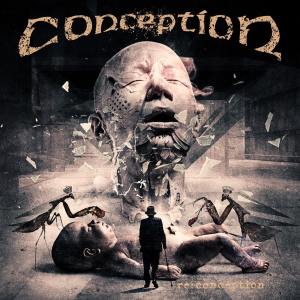
I usually don’t review individual songs or single releases, with few exceptions, and Conception’s first new music in what, twenty-one friggin years certainly qualifies. Their EP is coming out in a few weeks and this single has two pieces of music that will be on that release and one exclusive track, “Feather Moves”. I’ll talk more about the songs at length on the review for the EP in the future but I just wanted to chime in here to talk about the stunning realization that we’re hearing Roy Khan’s vocals once again. Most of you have read that piece I did on Khan many years ago about the giant hole he was leaving behind not only in Kamelot but in progressive / power metal in general with his at the time retirement. The nature of his departure from Kamelot, the cryptic statement he released at the time —- everything really pointed towards a permanent exit, and I just couldn’t help but be a little selfish about it, thinking of all the great lyrics and vocal melodies we were being denied. When news broke that he was heard (literally) in a Norwegian rehearsal studio jamming with his former Conception bandmates, the classic lineup at that, I may or may not have gone into full on denial mode. But with April’s Pledgemusic campaign announcement, everything was confirmed and so was the utter joy at not having to watch another year tick by where Khan’s talents were being utilized.
He simply sounds excellent on these two songs (one instrumental, yeah… I know), his voice rich and full of that ability to inflect incredible amounts of emotion in a single phrase. To Conception’s credit, they’re really picking up where they left off on Flow, with heavily rhythmic, undulating (I sure love that word lately it seems) riff progressions and impassioned songwriting. Tore Østby is shredding all over the place, with little interjections and micro-solos to fill in the vocal gaps, and the rhythm section of bassist Ingar Amlien and drummer Arve Heimdal playing in unconventional, groove oriented, almost poly-rhythmic patterns. But wisely, Khan is left to direct traffic with his vocal melodies, singularly able to shift the tone of a song from dark and stormy to angelic and uplifting as we get to hear on the chorus to “Grand Again”. There’s a filter on his voice in select moments on this song, nothing that’s distracting, in fact it actually adds to the song but I would like to hear something on the EP that really sees him cut loose. His range does not appear to be diminished in the slightest, I’d even say he sounds close to Ghost Opera era Kamelot here. Hopefully the time off did him good in that regard, to lay off the heavy touring and simply rest his vocal chords. There’s folks voicing concerns about the future of Tommy Karevik’s own golden pipes due to Kamelot’s touring schedule, but I think that’s a long way off, being that he’s almost a decade under Khan in age. There’s a morality tale here for career bands, to reconsider making a living from being on the road and go the semi-professional route like our guy Tuomas Saukkonen from Wolfheart. At the end of the day, its about an artistic legacy right?

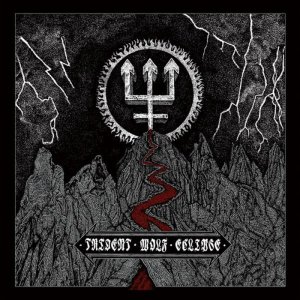 Watain – Trident Wolf Eclipse:
Watain – Trident Wolf Eclipse: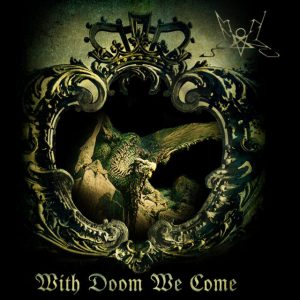 Summoning – With Doom We Come:
Summoning – With Doom We Come: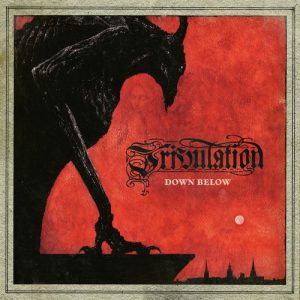 Tribulation – Down Below:
Tribulation – Down Below: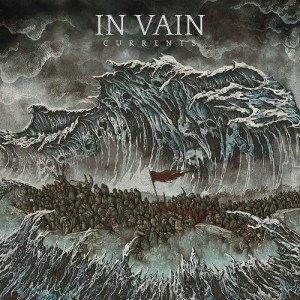 In Vain – Currents:
In Vain – Currents: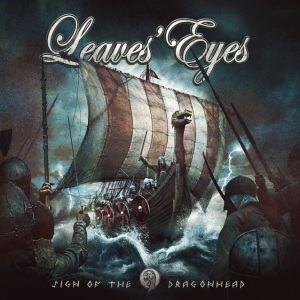 Leaves Eyes – Sign of the Dragonhead:
Leaves Eyes – Sign of the Dragonhead: The bounty of spring indeed, because this month I’ve found myself going through at least eight new releases, a few of which aren’t listed in the reviews below but might be up later sometime. Some of these are also late February releases that I had overlooked that month or simply thought were coming out in March (or more accurately, I didn’t get around to listening to until recently). There’s a lot to get to and I’ve tried to keep things short and concise for you and me both, so we’ll apply that to this preamble too. Begin!
The bounty of spring indeed, because this month I’ve found myself going through at least eight new releases, a few of which aren’t listed in the reviews below but might be up later sometime. Some of these are also late February releases that I had overlooked that month or simply thought were coming out in March (or more accurately, I didn’t get around to listening to until recently). There’s a lot to get to and I’ve tried to keep things short and concise for you and me both, so we’ll apply that to this preamble too. Begin!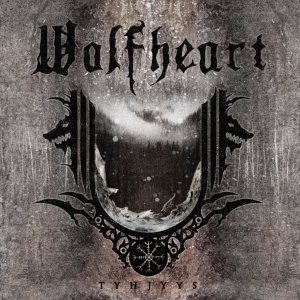 Wolfheart – Tyhjyys:
Wolfheart – Tyhjyys: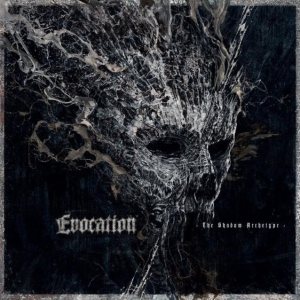 Evocation – The Shadow Archetype:
Evocation – The Shadow Archetype: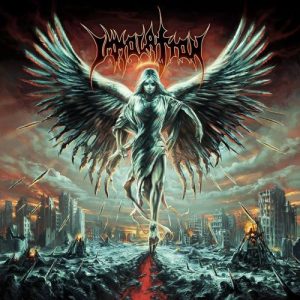 Immolation – Atonement:
Immolation – Atonement: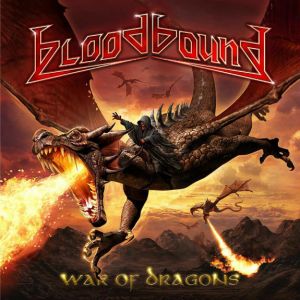 Bloodbound – War of Dragons:
Bloodbound – War of Dragons: Mors Principium Est – Embers of a Dying World:
Mors Principium Est – Embers of a Dying World: Subterranean Masquerade – The Great Bazaar:
Subterranean Masquerade – The Great Bazaar: Kiske/Somerville – City of Heroes:
Kiske/Somerville – City of Heroes:  Thurisaz – The Pulse of Mourning:
Thurisaz – The Pulse of Mourning: Jorn Lande & Trond Holter – Dracula: Swing of Death:
Jorn Lande & Trond Holter – Dracula: Swing of Death: Monox – Perception Changes:
Monox – Perception Changes: Melechesh – Enki:
Melechesh – Enki: Ensiferum – One Man Army: First a mild rant: There was a time around the late 90s and early to mid 2000s when folk metal wasn’t an overcrowded subgenre, when the balance between folk and metal was handled deftly by a small cadre of accomplished bands, and when their lyrical subject matter had depth and richness. I’m thinking of those heady times when folk metal meant Skyclad, Amorphis, Subway to Sally, Otyg/Vintersorg, Falkenbach, among a few others. It was a subgenre that was creating vital, shimmering music that was stretching the boundaries of what metal could sound like —- it was fresh and exciting, the sound of things you didn’t know you always wanted to hear. Ensiferum’s first two albums were part of this wonderful era, being near-perfect marriages of thrashy guitars, power metal songwriting, and folky instrumentation.
Ensiferum – One Man Army: First a mild rant: There was a time around the late 90s and early to mid 2000s when folk metal wasn’t an overcrowded subgenre, when the balance between folk and metal was handled deftly by a small cadre of accomplished bands, and when their lyrical subject matter had depth and richness. I’m thinking of those heady times when folk metal meant Skyclad, Amorphis, Subway to Sally, Otyg/Vintersorg, Falkenbach, among a few others. It was a subgenre that was creating vital, shimmering music that was stretching the boundaries of what metal could sound like —- it was fresh and exciting, the sound of things you didn’t know you always wanted to hear. Ensiferum’s first two albums were part of this wonderful era, being near-perfect marriages of thrashy guitars, power metal songwriting, and folky instrumentation. Marilyn Manson – The Pale Emperor: A week or so ago when recording
Marilyn Manson – The Pale Emperor: A week or so ago when recording  Napalm Death – Apex Predator – Easy Meat: I guess I never had planned on ever writing about Napalm Death on this blog, not because I don’t enjoy them —- I do, but because I figured that there wasn’t much to elaborate on. Napalm Death will always sound like Napalm Death to me. I grew up listening to them, first being introduced to their grindcore/metal blend via dubbed cassette tapes by various heavy music loving friends back in middle school. They were one of those bridge bands to extreme metal, alongside Morbid Angel and Death and Carcass. More than those bands, Napalm Death delivered the kind of sheer caterwauling noise that a young budding metal fan gravitated towards because it simply sounded like something that was made for you and all the reasons you enjoyed having your parents lament your taste in music. I enjoyed playing them in my battered, sticker covered boom box in my bedroom, imagining that even with my door closed, it still sounded like hell on the other side. Maybe its fair to say that I never developed much of an emotional attachment to their music, but I don’t think it was ever designed that way.
Napalm Death – Apex Predator – Easy Meat: I guess I never had planned on ever writing about Napalm Death on this blog, not because I don’t enjoy them —- I do, but because I figured that there wasn’t much to elaborate on. Napalm Death will always sound like Napalm Death to me. I grew up listening to them, first being introduced to their grindcore/metal blend via dubbed cassette tapes by various heavy music loving friends back in middle school. They were one of those bridge bands to extreme metal, alongside Morbid Angel and Death and Carcass. More than those bands, Napalm Death delivered the kind of sheer caterwauling noise that a young budding metal fan gravitated towards because it simply sounded like something that was made for you and all the reasons you enjoyed having your parents lament your taste in music. I enjoyed playing them in my battered, sticker covered boom box in my bedroom, imagining that even with my door closed, it still sounded like hell on the other side. Maybe its fair to say that I never developed much of an emotional attachment to their music, but I don’t think it was ever designed that way. Marduk – Frontschwein:
Marduk – Frontschwein: Nightwish – Elan (EP):
Nightwish – Elan (EP): Delain – The Human Contradiction: First things first, kudos to said reader who persuaded me to give Delain’s newest album a shot, because this was a band that had failed to impress me at any point in their career previously. In fact, their last album featured a single/video that actually made me cringe, the pallid “We Are the Others”, a heart on sleeve “anthem” directed squarely at the hearts of this band’s core audience, namely, disaffected rock/metal adoring teenage girls (and I suppose some guys as well). How can I be so blasé about a band like Delain while I sing the praises of the biggest female fronted band of them all in Nightwish? Simple: Because the latter is a vehicle for the self-centric artistic motivations and confessions of one Tuomas Holopainen, who also happens to be a uniquely brilliant songwriter whose lyrical voice I’m fascinated by. As we all know by now, the female voice singing Holopainen’s songs is less important than the actual content/context of songs themselves (be honest, when you read the lyrics of “Ever Dream”, do you innately hear Tuomas or Tarja’s voice?).
Delain – The Human Contradiction: First things first, kudos to said reader who persuaded me to give Delain’s newest album a shot, because this was a band that had failed to impress me at any point in their career previously. In fact, their last album featured a single/video that actually made me cringe, the pallid “We Are the Others”, a heart on sleeve “anthem” directed squarely at the hearts of this band’s core audience, namely, disaffected rock/metal adoring teenage girls (and I suppose some guys as well). How can I be so blasé about a band like Delain while I sing the praises of the biggest female fronted band of them all in Nightwish? Simple: Because the latter is a vehicle for the self-centric artistic motivations and confessions of one Tuomas Holopainen, who also happens to be a uniquely brilliant songwriter whose lyrical voice I’m fascinated by. As we all know by now, the female voice singing Holopainen’s songs is less important than the actual content/context of songs themselves (be honest, when you read the lyrics of “Ever Dream”, do you innately hear Tuomas or Tarja’s voice?). Nightmare – The Aftermath: I’ve always wanted to like France’s Nightmare. On paper I really should, since they’re supposedly right up my alley: They’re a hybrid trad/power metal band from a country that is fairly most associated with post-black metal ala Alcest; and their longtime vocalist Jo Amore is a fairly decent blend of Dio and Jorn Lande (himself a pretty good Dio stand-in). They also have the respectable career back story of coming back from a thirteen year absence in 1999 to give it another go after their record label in the mid-eighties flamed out and took the band’s enthusiasm with it. That fact alone has always had me rooting for them and giving each new release a few spins. So it was halfway through my fourth spin with this new album when I remembered why it took my American power metal fan’s guilt to muster enough patience to sit through a new Nightmare offering. I’m glad The Aftermath ended up in this reviews roundup, with an emphasis on these reviews being shorter, because I’d be stumped for what to really say in depth about this album. My biggest problem with Nightmare overall has always been their lack of good songwriting/songwriters —- not to suggest that there is “bad” songwriting on display here, this is passable metal that wouldn’t be a damp towel on the beer drinkin’ in the garage good times of your average pack of metal fans, but it doesn’t pass the most important test for me, namely the ability to enjoy the album by oneself in the car or on headphones. During my last play through, I actually reached a point where Amore’s vocals began to grate on me, and that was more a result of his having to sing over go nowhere riffs/melodies and aimless songs. Hooks in songwriting actually need to bell curve up, you know… resemble a friggin’ hook.
Nightmare – The Aftermath: I’ve always wanted to like France’s Nightmare. On paper I really should, since they’re supposedly right up my alley: They’re a hybrid trad/power metal band from a country that is fairly most associated with post-black metal ala Alcest; and their longtime vocalist Jo Amore is a fairly decent blend of Dio and Jorn Lande (himself a pretty good Dio stand-in). They also have the respectable career back story of coming back from a thirteen year absence in 1999 to give it another go after their record label in the mid-eighties flamed out and took the band’s enthusiasm with it. That fact alone has always had me rooting for them and giving each new release a few spins. So it was halfway through my fourth spin with this new album when I remembered why it took my American power metal fan’s guilt to muster enough patience to sit through a new Nightmare offering. I’m glad The Aftermath ended up in this reviews roundup, with an emphasis on these reviews being shorter, because I’d be stumped for what to really say in depth about this album. My biggest problem with Nightmare overall has always been their lack of good songwriting/songwriters —- not to suggest that there is “bad” songwriting on display here, this is passable metal that wouldn’t be a damp towel on the beer drinkin’ in the garage good times of your average pack of metal fans, but it doesn’t pass the most important test for me, namely the ability to enjoy the album by oneself in the car or on headphones. During my last play through, I actually reached a point where Amore’s vocals began to grate on me, and that was more a result of his having to sing over go nowhere riffs/melodies and aimless songs. Hooks in songwriting actually need to bell curve up, you know… resemble a friggin’ hook. Goatwhore – Constricting Rage Of The Merciless: This is the first Goatwhore album I’ve listened to since 2006’s A Haunting Curse, and I’m coming away pleasantly surprised. I was never personally big on Goatwhore, but I’ve enjoyed them in passing over the past decade plus because I grew up alongside friends and roommates who were VERY big on Goatwhore. My mind is going back in particular to one Bill Hendricks, who was big on all things NOLA metal related in general. He introduced myself and others to the feral pleasures of Goatwhore albums and live shows and it just became one of those touchstones that we randomly had in our metal educations. In the interest of full disclosure I’ve developed a bit of an inborn prejudice towards bands with purposefully schlock horror-ish names, I suppose because when you grow up it feels a lot more sillier to proudly proclaim that you listen to a band called Cannibal Corpse than it did in sixth grade. But I still appreciate a whole host of bands that fall under that “juvenile” tag (and let’s be honest, how mature did the name Megadeth ever seem really?).
Goatwhore – Constricting Rage Of The Merciless: This is the first Goatwhore album I’ve listened to since 2006’s A Haunting Curse, and I’m coming away pleasantly surprised. I was never personally big on Goatwhore, but I’ve enjoyed them in passing over the past decade plus because I grew up alongside friends and roommates who were VERY big on Goatwhore. My mind is going back in particular to one Bill Hendricks, who was big on all things NOLA metal related in general. He introduced myself and others to the feral pleasures of Goatwhore albums and live shows and it just became one of those touchstones that we randomly had in our metal educations. In the interest of full disclosure I’ve developed a bit of an inborn prejudice towards bands with purposefully schlock horror-ish names, I suppose because when you grow up it feels a lot more sillier to proudly proclaim that you listen to a band called Cannibal Corpse than it did in sixth grade. But I still appreciate a whole host of bands that fall under that “juvenile” tag (and let’s be honest, how mature did the name Megadeth ever seem really?). Septicflesh – Titan: Remember how just a few sentences ago, I was going on a bit about bands with juvenile sounding names that might defy expectations by releasing adventurous, experimental music contrary to what you were expecting (ala Rotting Christ)? It must really be a Greek thing then, because Septicflesh is another band that hails from the inadequately governed mean streets of Athens, and they too play an unorthodox take on traditional death metal. Whereas Rotting Christ utilize heavy injections of Greek folk music and black metal repetitive hypnotics in their music, Septicflesh swing in the other extreme direction by infusing experimental symphonic elements into the fabric of their songwriting. Think modern day Therion’s classical trajectory meeting Behemoth’s blackened death metal, and you’ll have a good idea of what to expect here. I’m surprised at just how wonderfully challenging Titan is as a sheer musical experience. Simultaneously and conversely punishing, exultant, and beautiful —- there’s a lot to absorb here. But before I start going off with superlatives galore, I’m told by those who know that many a Septicflesh fan has found this album to be a step below their previous album, 2011’s The Great Mass, which I have not listened to. So with that in mind its perhaps fair to leave in the possibility of a different comparative opinion depending on your perspective.
Septicflesh – Titan: Remember how just a few sentences ago, I was going on a bit about bands with juvenile sounding names that might defy expectations by releasing adventurous, experimental music contrary to what you were expecting (ala Rotting Christ)? It must really be a Greek thing then, because Septicflesh is another band that hails from the inadequately governed mean streets of Athens, and they too play an unorthodox take on traditional death metal. Whereas Rotting Christ utilize heavy injections of Greek folk music and black metal repetitive hypnotics in their music, Septicflesh swing in the other extreme direction by infusing experimental symphonic elements into the fabric of their songwriting. Think modern day Therion’s classical trajectory meeting Behemoth’s blackened death metal, and you’ll have a good idea of what to expect here. I’m surprised at just how wonderfully challenging Titan is as a sheer musical experience. Simultaneously and conversely punishing, exultant, and beautiful —- there’s a lot to absorb here. But before I start going off with superlatives galore, I’m told by those who know that many a Septicflesh fan has found this album to be a step below their previous album, 2011’s The Great Mass, which I have not listened to. So with that in mind its perhaps fair to leave in the possibility of a different comparative opinion depending on your perspective. Xandria – Sacrificum: This may sound strange, but I think one of the best things Germany’s Xandria has had going for them is that at any one point in time when I’ve listened to them, I’ve had no idea who their singer was. And they’ve had more than a few —- the new singer Dianne van Giersbergen is their fifth in the band’s now seventeen year history (for reals, on both accounts)! The side effect of a female fronted band having such a rotating cast of vocalists (particularly in the past couple years) is that the attention they receive is largely for the music itself rather than the appearance of the singer. If that sounds cynical, its because its a statement reflecting a great deal of reality —- after all, magazines don’t have those “Hottest Chicks In Metal” features for no reason right?
Xandria – Sacrificum: This may sound strange, but I think one of the best things Germany’s Xandria has had going for them is that at any one point in time when I’ve listened to them, I’ve had no idea who their singer was. And they’ve had more than a few —- the new singer Dianne van Giersbergen is their fifth in the band’s now seventeen year history (for reals, on both accounts)! The side effect of a female fronted band having such a rotating cast of vocalists (particularly in the past couple years) is that the attention they receive is largely for the music itself rather than the appearance of the singer. If that sounds cynical, its because its a statement reflecting a great deal of reality —- after all, magazines don’t have those “Hottest Chicks In Metal” features for no reason right?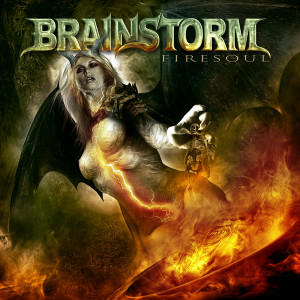 Brainstorm – Firesoul: My apologies to Andy B. Frank and the gang, it wasn’t that I willfully ignored you back in April, but your new album Firesoul had the misfortune of arriving directly in the midst of my receiving the new Edguy and Insomnium albums. Its not that I like those bands better… well, actually I do, but those were two releases that held the possibility of changing styles for both bands, for better or worse. I had to find out and so they immediately received my full attention, but in a way that’s complimentary towards you guys, because I’ve never had a reason to be concerned about what to expect on a new Brainstorm offering. You guys always deliver quality melodic power metal loaded with hooks and often impeccable choruses, and Andy sounds as ageless as ever. Consistency in producing good work is rare and admirable, and Brainstorm stand in the company of a select few in the power metal world in that regard. I love you guys.
Brainstorm – Firesoul: My apologies to Andy B. Frank and the gang, it wasn’t that I willfully ignored you back in April, but your new album Firesoul had the misfortune of arriving directly in the midst of my receiving the new Edguy and Insomnium albums. Its not that I like those bands better… well, actually I do, but those were two releases that held the possibility of changing styles for both bands, for better or worse. I had to find out and so they immediately received my full attention, but in a way that’s complimentary towards you guys, because I’ve never had a reason to be concerned about what to expect on a new Brainstorm offering. You guys always deliver quality melodic power metal loaded with hooks and often impeccable choruses, and Andy sounds as ageless as ever. Consistency in producing good work is rare and admirable, and Brainstorm stand in the company of a select few in the power metal world in that regard. I love you guys.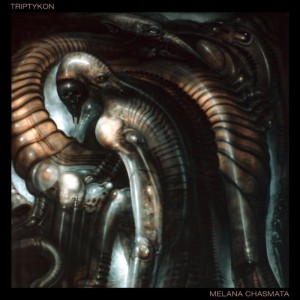 Triptykon – Melana Chasmata: Tom G. Warrior is back yet again with his second Triptykon album, and its also one of the most complex, densely written records of the year —- and that could be a great thing or a horrible thing depending on how well you can digest this stuff. In case you’re out of the loop, Triptykon was born in 2008 from the ashes of Celtic Frost, and in spirit and in sound it serves as a spiritual successor to that legendary band. Personally I’ve been a fan of Warrior’s work in general, even finding a few things to like about the infamous Cold Lake album (no, not “Dance Sleazy”), so my perception of this album might be vastly different to newcomers who should probably start off with one of the classic Celtic Frost releases. Of course a familiarity in the complexities of bands like Emperor would be a plus in being able to process the sheer unorthodoxy that is on display here. I really do like this album and feel that its one of the stronger records of 2014 overall, but it took me well over a dozen spins front to back to even remotely begin to feel that way. And I don’t mean a dozen cursory spins, I mean a dozen sit down with your headphones strapped on and close your eyes kinda spins. Its a tough nut to crack.
Triptykon – Melana Chasmata: Tom G. Warrior is back yet again with his second Triptykon album, and its also one of the most complex, densely written records of the year —- and that could be a great thing or a horrible thing depending on how well you can digest this stuff. In case you’re out of the loop, Triptykon was born in 2008 from the ashes of Celtic Frost, and in spirit and in sound it serves as a spiritual successor to that legendary band. Personally I’ve been a fan of Warrior’s work in general, even finding a few things to like about the infamous Cold Lake album (no, not “Dance Sleazy”), so my perception of this album might be vastly different to newcomers who should probably start off with one of the classic Celtic Frost releases. Of course a familiarity in the complexities of bands like Emperor would be a plus in being able to process the sheer unorthodoxy that is on display here. I really do like this album and feel that its one of the stronger records of 2014 overall, but it took me well over a dozen spins front to back to even remotely begin to feel that way. And I don’t mean a dozen cursory spins, I mean a dozen sit down with your headphones strapped on and close your eyes kinda spins. Its a tough nut to crack. Iron Savior – Rise of the Hero: I was so blown away by Iron Savior’s previous offering, 2011’s The Landing, that I met this album with a great degree of trepidation that only comes with metal fan experience. See its not at all unexpected or out of the ordinary that a veteran band should find another spark of inspiration many albums into their career —- it happened with Accept and their near masterpiece Blood of the Nations in 2010 for example. However, it is highly unlikely that such a resurgence carries over into more than one album, again I’ll reference Accept by pointing to the rather mediocre follow up they delivered in 2012’s Stalingrad. Iron Savior unfortunately walks into this same trap, and in unusually clumsy fashion as well. I honestly don’t understand some of the thinking behind a few of the songwriting choices on this record.
Iron Savior – Rise of the Hero: I was so blown away by Iron Savior’s previous offering, 2011’s The Landing, that I met this album with a great degree of trepidation that only comes with metal fan experience. See its not at all unexpected or out of the ordinary that a veteran band should find another spark of inspiration many albums into their career —- it happened with Accept and their near masterpiece Blood of the Nations in 2010 for example. However, it is highly unlikely that such a resurgence carries over into more than one album, again I’ll reference Accept by pointing to the rather mediocre follow up they delivered in 2012’s Stalingrad. Iron Savior unfortunately walks into this same trap, and in unusually clumsy fashion as well. I honestly don’t understand some of the thinking behind a few of the songwriting choices on this record. Freedom Call – Beyond: On paper I should enjoy the work of Freedom Call more than I actually do, as they are one of the happiest sounding bands in the genre alongside the now defunct Power Quest —- whom I loved. But what Power Quest had in spades compared to their European mainland cousins was the sheer pop songwriting brilliance of Steve Williams, who through his simple yet ultra-melodic keyboard lines not emulated and transcended the best of the eighties pop-rock bands he loved. Freedom Call is by this point the sole project of the only remaining original member, vocalist and guitarist Chris Bay, who does good work in his own particular milieu, if nothing truly remarkable. Freedom Call albums are predominantly spotty affairs, but they will usually guarantee a handful of good songs, an on occasion, some really great ones. They receive my attention as a power metal fan in spite of their flaws, mainly because I feel so passionately about the era they were born in.
Freedom Call – Beyond: On paper I should enjoy the work of Freedom Call more than I actually do, as they are one of the happiest sounding bands in the genre alongside the now defunct Power Quest —- whom I loved. But what Power Quest had in spades compared to their European mainland cousins was the sheer pop songwriting brilliance of Steve Williams, who through his simple yet ultra-melodic keyboard lines not emulated and transcended the best of the eighties pop-rock bands he loved. Freedom Call is by this point the sole project of the only remaining original member, vocalist and guitarist Chris Bay, who does good work in his own particular milieu, if nothing truly remarkable. Freedom Call albums are predominantly spotty affairs, but they will usually guarantee a handful of good songs, an on occasion, some really great ones. They receive my attention as a power metal fan in spite of their flaws, mainly because I feel so passionately about the era they were born in. Behemoth – The Satanist: This came as a total surprise, not it’s release mind you, but just the fact that in 2014 Behemoth may have just released the best album of their career, and for sure a contender for being considered one of the best albums of 2014. My history with this band is spotty at best, I’ve largely found their discography to be inconsistent, and for a few records, even uninteresting. I have always appreciated that they try their best not to be pigeon holed into one specific subgenre of metal, instead choosing to play with both black, death, and doom metal stylings… its just that those kinds of mergers require a rather steady hand at the songwriting helm, which I’ve never suspected Behemoth of having. The band’s songwriter is frontman, guitarist, and vocalist —- Nergal, who seems to have approached this album with a dose of inspiration undoubtedly gleaned from his near-fatal brush with leukemia in late 2010. On The Satanist, Nergal infuses not only death and black metal stylings, but adds in doses of ambient noise and even hard rock simplicity together in one of the most alluring and provocative blendings in recent memory.
Behemoth – The Satanist: This came as a total surprise, not it’s release mind you, but just the fact that in 2014 Behemoth may have just released the best album of their career, and for sure a contender for being considered one of the best albums of 2014. My history with this band is spotty at best, I’ve largely found their discography to be inconsistent, and for a few records, even uninteresting. I have always appreciated that they try their best not to be pigeon holed into one specific subgenre of metal, instead choosing to play with both black, death, and doom metal stylings… its just that those kinds of mergers require a rather steady hand at the songwriting helm, which I’ve never suspected Behemoth of having. The band’s songwriter is frontman, guitarist, and vocalist —- Nergal, who seems to have approached this album with a dose of inspiration undoubtedly gleaned from his near-fatal brush with leukemia in late 2010. On The Satanist, Nergal infuses not only death and black metal stylings, but adds in doses of ambient noise and even hard rock simplicity together in one of the most alluring and provocative blendings in recent memory. Grand Magus – Truimph and Power: I’ve grown to enjoy Grand Magus through their previous album, 2012’s The Hunt, it wasn’t a perfect record, but it had very high highs and no lows. I checked out the rest of their discography and found myself liking the older albums a little less, I wasn’t wild about their doomy past I suppose. Lucky for me the band seems hell bent on moving further and further away from those stylings and more into traditional metal territory on their newest, Truimph and Power. There are still doomy moments present, but they’re more touches and flourishes, ingrained within song structures themselves instead of being central to them. Apologies perhaps to fans of their older works, but this is an album that is hitting me right in my comfort zone.
Grand Magus – Truimph and Power: I’ve grown to enjoy Grand Magus through their previous album, 2012’s The Hunt, it wasn’t a perfect record, but it had very high highs and no lows. I checked out the rest of their discography and found myself liking the older albums a little less, I wasn’t wild about their doomy past I suppose. Lucky for me the band seems hell bent on moving further and further away from those stylings and more into traditional metal territory on their newest, Truimph and Power. There are still doomy moments present, but they’re more touches and flourishes, ingrained within song structures themselves instead of being central to them. Apologies perhaps to fans of their older works, but this is an album that is hitting me right in my comfort zone. In the case of Greece’s Rotting Christ, this was a band I hadn’t listened to in perhaps under a decade and had long ago written off as uninteresting (I’ve since checked out their back catalog on Spotify only to realize how wrong I was). Unbeknownst to me until now, they’ve been steadily pursuing a musical change of direction on their past couple albums, and its all led to the most radicalized experimentation of their career on Kata Ton Daimona Eaytoy (Do What Thou Wilt), their eleventh studio album to date. Quite simply put, I love this album. Its one of the more bizarre imaginings of black metal that I’ve ever heard really. These guys dig down deep into their Greek heritage for some dark musical inspirations that really separate them from the hordes of Norwegian copycats. Unexpected amounts of melodicism, unorthodox percussive rhythms, very inspired blackened vocal arrangements and original songwriting are just a few touchstones to remark upon. The obvious standout for its sheer accessibility is “Grandis Spiritus Diavolos”, a steadfast march in which the title phrase is repeated in staccato rhythm over a bed of ultra-melodic guitar riffs, some Uli Jon Roth-style solo accompaniment, and Therion-ish choir vocals. On “Cine Jubeste Si Lasa”, things get really bizarre with the addition of very ethnic, gypsy-like female vocals of Souzana Vougioukli that intertwine with Sakis Tolis’ ever blackened grim vocals to hypnotic effect. It took me awhile to process what was going on in the track, but its quickly become a favorite.
In the case of Greece’s Rotting Christ, this was a band I hadn’t listened to in perhaps under a decade and had long ago written off as uninteresting (I’ve since checked out their back catalog on Spotify only to realize how wrong I was). Unbeknownst to me until now, they’ve been steadily pursuing a musical change of direction on their past couple albums, and its all led to the most radicalized experimentation of their career on Kata Ton Daimona Eaytoy (Do What Thou Wilt), their eleventh studio album to date. Quite simply put, I love this album. Its one of the more bizarre imaginings of black metal that I’ve ever heard really. These guys dig down deep into their Greek heritage for some dark musical inspirations that really separate them from the hordes of Norwegian copycats. Unexpected amounts of melodicism, unorthodox percussive rhythms, very inspired blackened vocal arrangements and original songwriting are just a few touchstones to remark upon. The obvious standout for its sheer accessibility is “Grandis Spiritus Diavolos”, a steadfast march in which the title phrase is repeated in staccato rhythm over a bed of ultra-melodic guitar riffs, some Uli Jon Roth-style solo accompaniment, and Therion-ish choir vocals. On “Cine Jubeste Si Lasa”, things get really bizarre with the addition of very ethnic, gypsy-like female vocals of Souzana Vougioukli that intertwine with Sakis Tolis’ ever blackened grim vocals to hypnotic effect. It took me awhile to process what was going on in the track, but its quickly become a favorite. And then there’s new kids on the block Cnoc An Tursa, who defy cheeky boy-band references with what sounds to me like a perfect melding of folk-infused thrash ala early Ensiferum with some of the most excellent blackened vocals that I’ve heard in recent memory. I’ve seen these guys tagged as viking metal or folk metal, and that’s a gross oversimplification. First of all, forget the Viking stuff, these guys are a Scottish band that emphasize a musical and lyrical focus on their nation’s history and culture in a rather eloquent fashion. They draw upon the well of great Scottish poetry for their lyrical inspiration, as in “Bannockburn”, which depicts the battle that was central to the Robert Burns poem of the same name (and they do so in rather Burns-ian language themselves). On other tracks they essentially set a beloved Scottish poem to a bleak, wintry, blackened folk sound scape as with “Culloden Moor”, which works far better than the idea looks on paper.
And then there’s new kids on the block Cnoc An Tursa, who defy cheeky boy-band references with what sounds to me like a perfect melding of folk-infused thrash ala early Ensiferum with some of the most excellent blackened vocals that I’ve heard in recent memory. I’ve seen these guys tagged as viking metal or folk metal, and that’s a gross oversimplification. First of all, forget the Viking stuff, these guys are a Scottish band that emphasize a musical and lyrical focus on their nation’s history and culture in a rather eloquent fashion. They draw upon the well of great Scottish poetry for their lyrical inspiration, as in “Bannockburn”, which depicts the battle that was central to the Robert Burns poem of the same name (and they do so in rather Burns-ian language themselves). On other tracks they essentially set a beloved Scottish poem to a bleak, wintry, blackened folk sound scape as with “Culloden Moor”, which works far better than the idea looks on paper.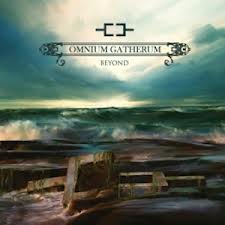 Finally, there’s been the newest release by Finland’s Omnium Gatherum, a band that I was initially introduced to through their highly acclaimed 2011 New World Shadows album. It took me quite awhile to really sink into that album, not because I found it lacking — the opposite actually, there was so much going on that was just way different from anything else I’d come to expect from melodic death metal. Odd drum patterns, alternately shifting tempos, bleak-washing atmospherics, and of course the obsidian vocals of Jukka Pelkonen. This is a weird comparison, but once I finally broke through with repeated listens, it felt like I had cracked the secrets of a musical Rubik’s cube — suddenly it all made sense and sounded right. So getting a chance to hear new music from these guys with that hurdle behind me has been a real pleasure. Their new album, Beyond, is to me an even better collection of music than it’s predecessor. Whether its on the lead single, “The Unknowing”, with its sweeping arpeggio based musical refrain that is as cinematic as it is memorable, or on the breathy, acoustic laced “Luoto” and its buildup to the hooky rock guitar driven “New Dynamic”; this album delivers with a diverse range of songs that stretch the band’s trademark sound. This is especially true on the clean vocal laden “Who Could Say”, in which Pelkonen seems to draw on equal parts Sentenced and Amorphis.
Finally, there’s been the newest release by Finland’s Omnium Gatherum, a band that I was initially introduced to through their highly acclaimed 2011 New World Shadows album. It took me quite awhile to really sink into that album, not because I found it lacking — the opposite actually, there was so much going on that was just way different from anything else I’d come to expect from melodic death metal. Odd drum patterns, alternately shifting tempos, bleak-washing atmospherics, and of course the obsidian vocals of Jukka Pelkonen. This is a weird comparison, but once I finally broke through with repeated listens, it felt like I had cracked the secrets of a musical Rubik’s cube — suddenly it all made sense and sounded right. So getting a chance to hear new music from these guys with that hurdle behind me has been a real pleasure. Their new album, Beyond, is to me an even better collection of music than it’s predecessor. Whether its on the lead single, “The Unknowing”, with its sweeping arpeggio based musical refrain that is as cinematic as it is memorable, or on the breathy, acoustic laced “Luoto” and its buildup to the hooky rock guitar driven “New Dynamic”; this album delivers with a diverse range of songs that stretch the band’s trademark sound. This is especially true on the clean vocal laden “Who Could Say”, in which Pelkonen seems to draw on equal parts Sentenced and Amorphis.
 The Clayman album in particular was an incredibly important record to me on a personal level. For various reasons, the fall of 2000 was a confusing, turbulent, and overwhelming time full of insecurity and depression and that album became an aural security blanket. I phrase it so because that disc was never out of reach. I had just started university, had begun working a new job, and moved into an apartment near downtown, so I was commuting all the time across Houston with In Flames blasting in my car and in essence becoming the soundtrack to one of the coldest falls and winters I can remember. I loved The Jester Race as well for sure; its hypnotic, beautiful guitars and crushing brutality blowing my mind in ways I never imagined music could (and I remember thinking to myself back then that this was the kind of music I had been subconsciously trying to find for years), however Clayman shared in these new found feelings to an even greater extent. The Wikipedia entry for Clayman lists its lyrical subject matter as “depression and internal struggles”, and it was in these lyrics that I found for the first time an album that seemed to speak to exactly what I was going through at that precise moment. Every single song held some nugget of truth for me, even if it was just like holding up a mirror to myself — it was really the first time that music had impacted me in that severe, stark, and honest manner.
The Clayman album in particular was an incredibly important record to me on a personal level. For various reasons, the fall of 2000 was a confusing, turbulent, and overwhelming time full of insecurity and depression and that album became an aural security blanket. I phrase it so because that disc was never out of reach. I had just started university, had begun working a new job, and moved into an apartment near downtown, so I was commuting all the time across Houston with In Flames blasting in my car and in essence becoming the soundtrack to one of the coldest falls and winters I can remember. I loved The Jester Race as well for sure; its hypnotic, beautiful guitars and crushing brutality blowing my mind in ways I never imagined music could (and I remember thinking to myself back then that this was the kind of music I had been subconsciously trying to find for years), however Clayman shared in these new found feelings to an even greater extent. The Wikipedia entry for Clayman lists its lyrical subject matter as “depression and internal struggles”, and it was in these lyrics that I found for the first time an album that seemed to speak to exactly what I was going through at that precise moment. Every single song held some nugget of truth for me, even if it was just like holding up a mirror to myself — it was really the first time that music had impacted me in that severe, stark, and honest manner. Bringing all this up, however, is already an online metal cliche — I’m not saying anything that most other fans of classic era In Flames haven’t thought to themselves or spouted out on metal forums the web over. What I’d like to point out however is that the guys in the band are now failing to realize that despite eagerly proclaiming that they only want to look forward and not repeat themselves, they have been spinning their wheels with their last few albums and in essence have been doing exactly what they claim they work so hard to avoid. The sounds and styles of Reroute to Remain, Soundtrack to Your Escape, Come Clarity, A Sense of Purpose, and Sounds of a Playground Fading are the same! As a fan I’ve been patient and have allowed a certain degree of flexibility in this area, thinking that these guys were obviously very keen on heading in this direction and that hopefully they would get it out of their system within a couple albums and move on (and I don’t mean to suggest they go back to their earlier style even, but simply “move on” to something else). But five albums have been delivered in this style, far more than just a couple, and while there are a few pretty good songs on each of these albums, particularly Come Clarity, they consistently failed to deliver the front to back excellence of any of the classic era releases.
Bringing all this up, however, is already an online metal cliche — I’m not saying anything that most other fans of classic era In Flames haven’t thought to themselves or spouted out on metal forums the web over. What I’d like to point out however is that the guys in the band are now failing to realize that despite eagerly proclaiming that they only want to look forward and not repeat themselves, they have been spinning their wheels with their last few albums and in essence have been doing exactly what they claim they work so hard to avoid. The sounds and styles of Reroute to Remain, Soundtrack to Your Escape, Come Clarity, A Sense of Purpose, and Sounds of a Playground Fading are the same! As a fan I’ve been patient and have allowed a certain degree of flexibility in this area, thinking that these guys were obviously very keen on heading in this direction and that hopefully they would get it out of their system within a couple albums and move on (and I don’t mean to suggest they go back to their earlier style even, but simply “move on” to something else). But five albums have been delivered in this style, far more than just a couple, and while there are a few pretty good songs on each of these albums, particularly Come Clarity, they consistently failed to deliver the front to back excellence of any of the classic era releases.